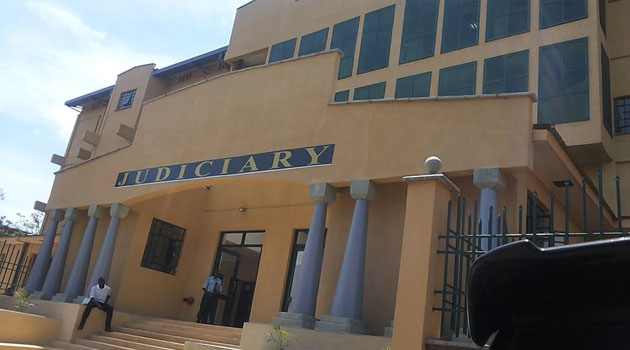
Speaking during the unveiling of the report, TI -Kenya Executive Director Samuel Kimeu called for an audit of the reform process should be done to isolate areas of weakness that continue to provide fertile ground for corruption/FILE
Kenya Police which usually tops the list in previous study recorded marginal decrease in the period of study ranging between 2010 and 2014.
Speaking during the unveiling of the report, TI -Kenya Executive Director Samuel Kimeu called for an audit of the reform process should be done to isolate areas of weakness that continue to provide fertile ground for corruption.
He said inaction or slow action on corruption cases may have contributed to a high perception of corruption.
The report which targeted 53,784 respondents, randomly sampled from the five East African countries stated the average size of bribe in the Judiciary, decreased from Sh11,046 in 2010 to Sh7,885 in 2014.
“The aggregate score for the Judiciary did not substantially change across the last five years. It can however be noted that midway in the study period, the score was at its lowest to below 30 points before rising again to the last year’s level of 47 points. At the regional level, the Judiciary registered the highest average size of bribe paid among similar institutions,” read the survey released in Nairobi on Thursday.
In the Land Ministry, the average size of bribe only fell slightly from Sh8,973 to about Sh7,219. Even with this fall, the survey observed that the figures in the mid period were quite high reaching almost Sh10,000 in 2012.
In the police service, the survey reports there was a steady decrease in the average size of bribe between 2010 and 2012 but this trend reversed in 2013 when the amounts increased.
The size of bribe paid to the tax services between the year 2010 and 2013 averaged Sh3,400 and almost doubled to reach Sh6,815 in 2014.
“The aggregate score fell from a high of 40 points in 2010 to 23 in 2014. However it can be noted that the 2014 score was a marked rise from the score in 2012 and 2013 which was at 14 points. The share of total bribes reported to have been paid to the institution has remained largely constant at around 3 percent,” the report stated.
Kimeu noted that the 58 percent of respondents believed the government is doing enough to fight graft but still believe levels of corruption were high.
The survey noted that only an average of 7 percent of those who encountered bribery incidents reported to any authority.
The most common reason for not reporting bribery reported was the belief that nothing would be done to resolve their complaint
The most common reason for paying bribes in Kenya (38 percent) was to hasten service delivery in the institutions that were visited as seen in the table below.
Kimeu said the survey results reveals that there is a clear pattern of poor perception on the efficacy and public confidence on the governments’ response to corruption.
In terms of overall ranking of countries, Rwanda remains the least bribery prone country in the region.
“In the first two years of inclusion of Rwanda into the East African Bribery Index, the reported incidents of bribery were too few to allow for the compilation of an index,” Kimeu noted while unveiling the survey findings.
“The most adverse overall likelihood of encountering bribery was registered by Uganda in 2012 at 40.7 percent. Rwanda recorded the most positive outcome of likelihood of encountering bribery at 4.4 percent, both in 2013 and 2014.”
The T.I. Executive Director called on the government to ensure that Office of the Auditor General and the EACC has enough operational and institutional independence to deliver on the anti-corruption mandate.
“The issue of granting the body powers to prosecute need to be positively considered. Though there has been some movement in terms of follow up on recommendations made by EACC to the Director of Public Prosecutions, the affront against corruption stand to benefit greatly from an anti-corruption commission that enjoys greater independence,” Kimeu said.









































